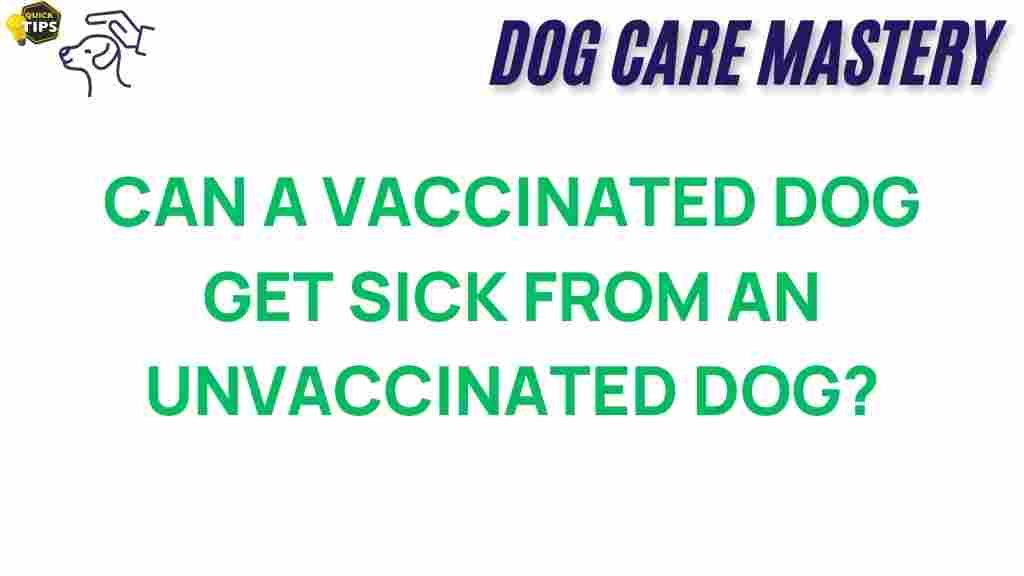The Risks of Vaccination: Can Your Dog Get Sick from Unvaccinated Pooches?
Vaccination is one of the most effective ways to protect your dog from serious diseases. However, many pet owners have concerns about the risks associated with vaccinations and the potential for exposure to diseases from unvaccinated dogs. In this article, we will explore the risks of vaccination and discuss whether a vaccinated dog can get sick from unvaccinated pooches. Understanding these aspects is essential for every dog owner to ensure their furry friends remain healthy and safe.
Understanding Vaccination for Dogs
Vaccination involves administering a vaccine to stimulate a dog’s immune system against specific diseases. Vaccines can be divided into two categories:
- Core Vaccines: These are essential vaccinations that every dog should receive. They typically protect against diseases such as rabies, distemper, and parvovirus.
- Non-Core Vaccines: These are optional vaccines that may be recommended based on your dog’s lifestyle and risk factors. Examples include vaccines for Lyme disease and Bordetella (kennel cough).
Vaccinated dogs develop immunity, which helps them fight off infections caused by pathogens. However, they are not entirely immune and may still be susceptible to diseases, especially if they encounter unvaccinated dogs.
Can a Vaccinated Dog Get Sick from Unvaccinated Pooches?
While a vaccinated dog has a significantly lower risk of contracting diseases from unvaccinated dogs, it is still possible. Here are several factors that contribute to this risk:
- Vaccine Efficacy: No vaccine guarantees 100% protection. Some dogs may not respond adequately to vaccines, leaving them vulnerable to infections.
- Virus Strains: Some diseases have multiple strains. A vaccinated dog may be protected against certain strains but could be susceptible to others not covered by the vaccine.
- Immune System Status: A dog with a weakened immune system, due to age, illness, or medication, may not be able to fight off infections effectively, increasing the risk of illness.
Common Diseases Transmitted by Unvaccinated Dogs
Here are some common diseases that a vaccinated dog could potentially contract from unvaccinated pooches:
- Parvovirus: Highly contagious and often fatal, this virus affects a dog’s gastrointestinal tract.
- Distemper: This viral disease affects the respiratory, gastrointestinal, and nervous systems of dogs.
- Kennel Cough: A highly contagious respiratory disease that causes a persistent cough.
- Leptospirosis: This bacterial infection can lead to kidney damage and liver failure but is preventable through vaccination.
The Importance of Vaccination
Vaccination is not only crucial for your dog’s health but also for public health. By vaccinating your dog, you are contributing to herd immunity, which helps protect unvaccinated dogs and other vulnerable populations. Here are some reasons why vaccination is vital:
- Prevention of Serious Diseases: Vaccines help prevent diseases that can be life-threatening or result in long-term health issues.
- Reduction of Disease Spread: Vaccinated dogs are less likely to spread disease to other pets and wildlife.
- Cost-Effective: Preventing illness through vaccination is generally more cost-effective than treating diseases.
What to Do if Your Dog is Exposed to Unvaccinated Dogs
If your vaccinated dog has been in contact with unvaccinated dogs, it’s essential to monitor their health and take appropriate action. Here’s a step-by-step process to follow:
Step 1: Monitor Your Dog’s Health
Keep a close eye on your dog for any signs of illness. Symptoms may include:
- Vomiting or diarrhea
- Coughing or sneezing
- Loss of appetite
- Lethargy or unusual behavior
Step 2: Contact Your Veterinarian
If you notice any concerning symptoms, contact your veterinarian immediately. They will assess your dog’s health and may recommend diagnostic tests to determine if your dog has contracted an illness.
Step 3: Follow Your Vet’s Recommendations
Your veterinarian may suggest treatments or preventive measures based on your dog’s condition. This may include:
- Additional vaccinations
- Medications to treat symptoms
- Isolation from other dogs to prevent the spread of disease
Troubleshooting: Addressing Common Concerns About Vaccination
Many pet owners have questions and concerns about the vaccination process. Here are some common issues and how to address them:
Concern 1: Side Effects of Vaccination
Some dogs may experience mild side effects after vaccination, such as:
- Fever
- Swelling at the injection site
- Fatigue or lethargy
These side effects are typically mild and resolve on their own. However, if your dog experiences severe reactions, such as difficulty breathing or swelling of the face, seek veterinary care immediately.
Concern 2: The Cost of Vaccination
Vaccination costs can vary based on location, the type of vaccine, and your veterinarian. While it may seem expensive, consider the long-term cost of treating preventable diseases, which can be significantly higher.
Concern 3: Choosing the Right Vaccination Schedule
Consult your veterinarian to determine the best vaccination schedule for your dog. Factors like age, health, and lifestyle will influence this decision. For more information on vaccination schedules, visit [American Kennel Club](https://www.akc.org) here.
Conclusion
In conclusion, while a vaccinated dog is significantly less likely to get sick from unvaccinated pooches, the risk is not entirely eliminated. Vaccination plays a critical role in safeguarding your dog’s health and preventing the spread of diseases. By ensuring your dog is vaccinated and monitoring their health after exposure to unvaccinated dogs, you can help keep them safe and healthy. Remember, regular veterinary visits and open communication with your veterinarian are essential for managing your dog’s health and well-being.
For more information on dog vaccination and health, check out our article on dog care tips.
This article is in the category Health and created by dogcaremastery Team
